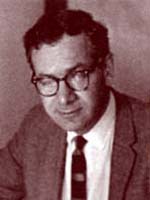Minnesota Romantic | Operas | Song Cycles | Choral Works | Orchestral | The Teacher/Composer | Timeline Part 4: Choral Works The composer's passion for the voice transcends the glorious solo roles he has created in his operas and song cycles. He loves massed voices as well. He has built a rich body of music that Minnesota choral organizations have taken around the world, in touring as well as on recordings.
Like Bruckner, Berlioz, and other masters Argento has set the Te Deum (1987), but he dilutes the pervasive solemnity of this hymn of praise. Cast in 21 sections, his setting alternates Latin and Old English texts, mixing the two languages to produce musical variety as well as textual contrasts. Each section is stylistically distinct. His Te Deum, prompted by a Buffalo, New York, commission, was nominated for a Grammy Award. Many consider it the outstanding choral/instrumental work of the century. Nobody knows Argento's choral music, much of it commissioned by Minnesota organizations, better than two of Minnesota's most prominent choral directors, Philip Brunelle and Dale Warland. "Achieving the balances that are the challenge of choral directing are built right into Argento's music," says Warland. "Not all composers consider how the tessitura—where the voice is placed in its range—will affect the balance. And when an instrument is blended with the voices, as in his lyrical setting of Wallace Stevens' Peter Quince at the Clavier, he makes sure that it enhances rather than competes with the chorus." As an operatic and choral conductor, Brunelle has spent
most of his career with Argento scores, beginning with the premiere
of Postcard from Morocco, which has totaled more productions worldwide
than any other Argento opera. "You understand when you conduct
an Argento piece that he knows exactly what it's going to sound like,"
Brunelle says. "He's an expert in knowing what the voice can
do, and what all the instruments do."
|
||||||||||||
MPR Home | News | Music Collection | Events | Radio Listening | Your Voice | About Us | Support Us | Help ©2005 Minnesota Public Radio | Terms of Use | Privacy Policy |
